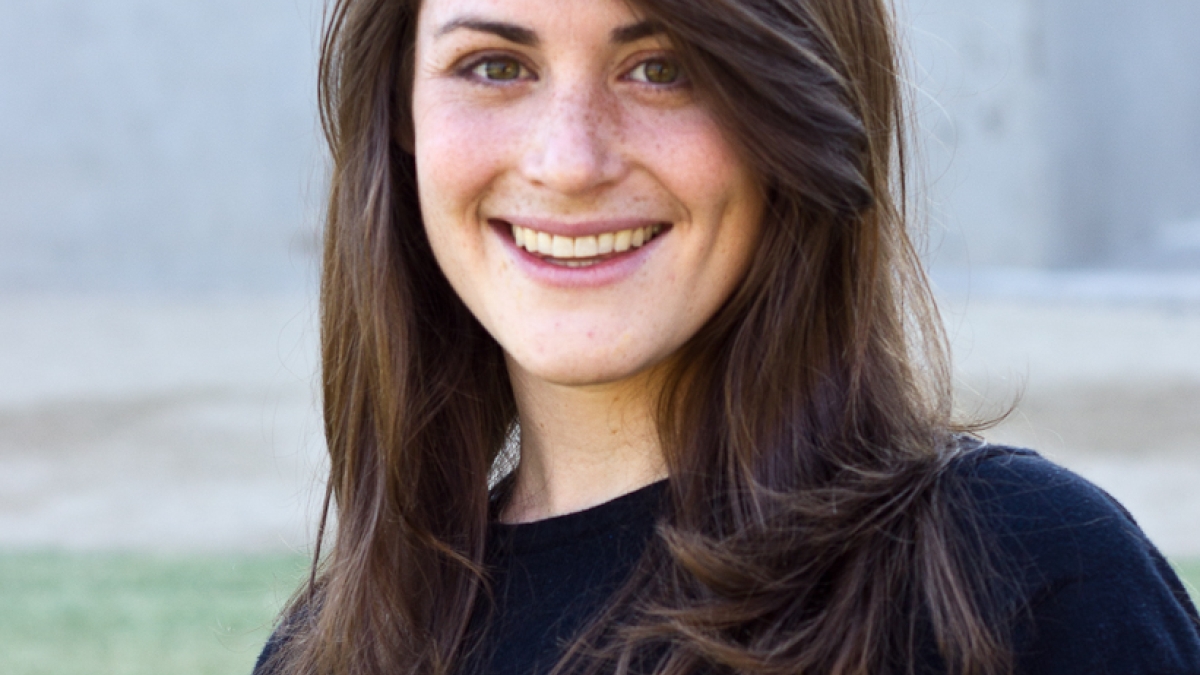Honors student earns Outstanding Graduate for Research award

At about the age of five, Madeline Sands attended a lecture at the Phoenix Public Library that would put her on a path toward academic endeavors and research fitting of any professional.
The lecturer was Donald Johanson, founding director of the Institute of Human Origins at Arizona State University. Johanson spoke about his archaeological work, including the 1974 discovery of the Lucy fossil in northeastern Ethiopia. At the time of its discovery, Lucy was the oldest and most complete skeleton of an adult human ancestor.
“I was fascinated by the finding of Lucy and inspired by Dr. Johanson. The process of going out into the field to answer the question of who we are and where we came from resonated with me. I never forgot his presentation and at a young age I started to look at the world as being a place of discovery. I could go out and seek to answer my own questions – this was my first introduction to research,” she said.
Sands drew upon that inspiration early and as an International Baccalaureate student at North High School in Phoenix, she engaged in her own physical anthropology research and wrote a paper on the scavenging habits of hominid Paranthropus boisei.
That interest in research followed her as she applied to Ivy League universities, ASU and the University of Arizona.
“I decided to come to ASU specifically for Barrett, the Honors College, and for the multiple research opportunities,” she said.
As she began her university experience as an honors student at ASU, Sands knew she wanted to be a doctor. Her interest in anthropology complemented a shift in focus towards medicine and public health research. She combined these interests and will graduate with a 4.0 GPA and a bachelor’s degree in anthropology, with a focus in pre-medicine and a minor in global health.
For her high academic achievement, her notable research, and her service, Sands has been given the Outstanding Graduate Award for Research from Barrett, The Honors College at ASU and will be acknowledged at the college’s convocation on May 8.
Throughout her rigorous academic career, Sands was immersed in archaeological field work, public health research, and community service as well.
She was on a team that excavated a Middle Pleistocene hyena den in South Africa, researched indigenous health care reform and interventions in Guatemala, worked on a team alongside fellow ASU engineers on a bio sensor that detects contaminated water, was a founding member of the Institute of Biological Engineering ASU chapter, co-authored many scientific articles and papers, tutored at the ASU Disability Resource Center, mentored middle school and high school, advised university students interested in healthcare professions, interned at the Mayo Clinic, and worked as a patient ambassador at Banner Good Samaritan Medical Center in Phoenix. She was a finalist for the Rhodes Scholarship and a runner-up for the Marshall Scholarship, both in 2012.
Additionally, she developed an independent research project on how legal training influences people’s moral judgments that received a National Science Foundation Research Experience for Undergraduates grant.
Her community service activities included leading fundraising efforts for school supplies and clothing donations for schools in underserved communities in Arizona and Guatemala.
“I am extremely honored and quite humbled to receive the award from Barrett," she said. "This award does not reflect my own efforts but rather showcases the exciting opportunities ASU has to offer, the wonderful guidance provided by the faculty, and the support of my fellow peers.”
Daniel Hrushka, ASU assistant professor of anthropology, who served as Sand’s professor, academic mentor and co-author, sings her praises.
“In her intellectual life, Maddie balances a drive for individual excellence with a deep capacity and motivation for teamwork,” he said. “Maddie is the only undergraduate in my lab I trust to take on leadership roles, and she easily matches or tops my graduate students in her contributions to research and writing.”
While Sands' undergraduate accomplishments have been many, her future goals are just as lofty. She plans to pursue a master’s in global health at ASU, followed by a doctorate and a medical degree, ultimately leading to a practice in internal or emergency medicine. Research also is in the offing for Sands.
“I want to be a doctor who works across cultural divides and borders. I want to provide the best care to my patients, through direct care as well as from a policy standpoint. I plan to still engage in public health and policy research regardless of the branch of medicine I pursue,” she said.